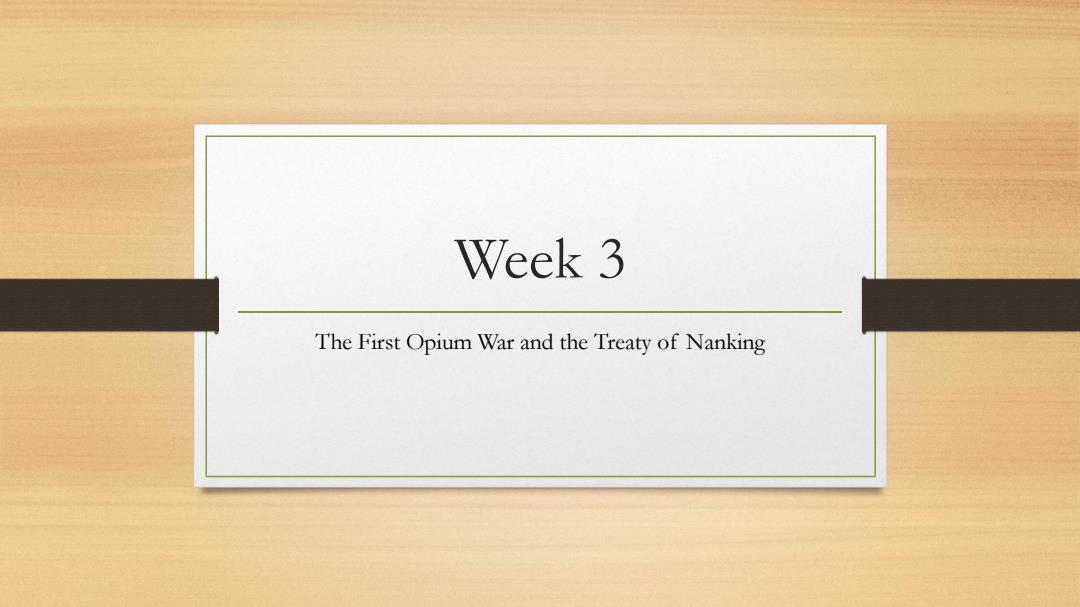
Week 3 The First Opium War and the Treaty of Nanking
Week 3 The First Opium War and the Treaty of Nanking
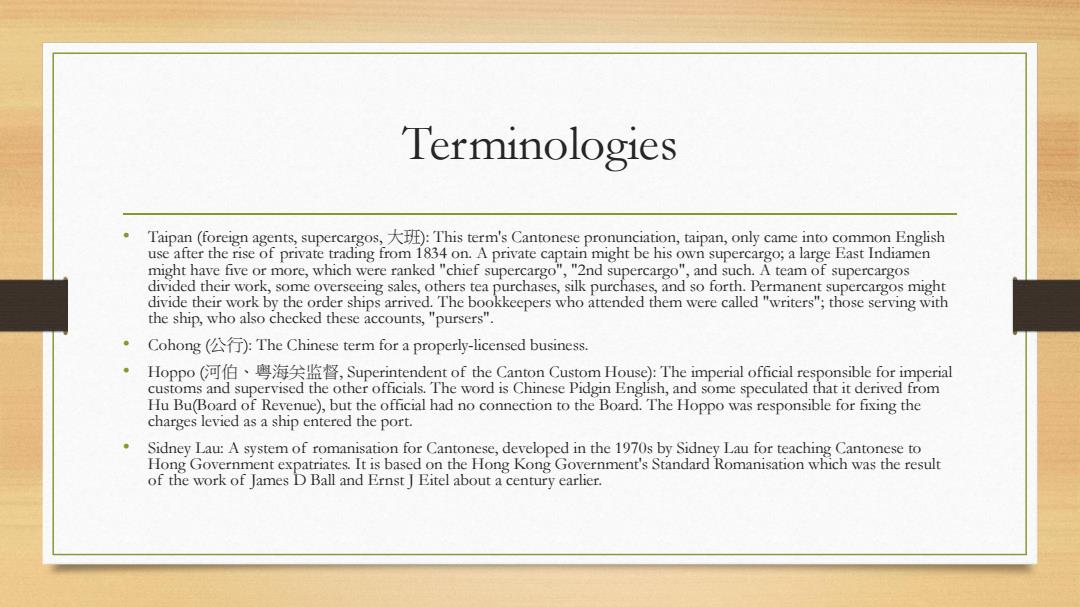
Terminologies Taipan(foreign agents,supercargos,):This term's Cantonese pronunciation,taipan,only came into common English use after the rise of private trading from 1834 on.A private captain might be his own supercargo;a large East Indiamen might have five or more,which were ranked"chief supercargo","2nd supercargo",and such.A team of supercargos divided their work,some overseeing sales,others tea purchases,silk purchases,and so forth.Permanent supercargos might divide their work by the order ships arrived.The bookkeepers who attended them were called "writers";those serving with the ship,who also checked these accounts,"pursers" Cohong(公行):The Chinese term for a properly--licensed business. Hoppo(C河伯、粤海矢监督,Superintendent of the Canton Custom House):The imperial official responsible for imperial customs and supervised the other officials.The word is Chinese Pidgin English,and some speculated that it derived from Hu Bu(Board of Revenue),but the official had no connection to the Board.The Hoppo was responsible for fixing the charges levied as a ship entered the port. Sidney Lau:A system of romanisation for Cantonese,developed in the 1970s by Sidney Lau for teaching Cantonese to Hong Government expatriates.It is based on the Hong Kong Government's Standard Romanisation which was the result of the work of James D Ball and Ernst J Eitel about a century earlier
Terminologies • Taipan (foreign agents, supercargos, 大班): This term's Cantonese pronunciation, taipan, only came into common English use after the rise of private trading from 1834 on. A private captain might be his own supercargo; a large East Indiamen might have five or more, which were ranked "chief supercargo", "2nd supercargo", and such. A team of supercargos divided their work, some overseeing sales, others tea purchases, silk purchases, and so forth. Permanent supercargos might divide their work by the order ships arrived. The bookkeepers who attended them were called "writers"; those serving with the ship, who also checked these accounts, "pursers". • Cohong (公行): The Chinese term for a properly-licensed business. • Hoppo (河伯、粤海关监督, Superintendent of the Canton Custom House): The imperial official responsible for imperial customs and supervised the other officials. The word is Chinese Pidgin English, and some speculated that it derived from Hu Bu(Board of Revenue), but the official had no connection to the Board. The Hoppo was responsible for fixing the charges levied as a ship entered the port. • Sidney Lau: A system of romanisation for Cantonese, developed in the 1970s by Sidney Lau for teaching Cantonese to Hong Government expatriates. It is based on the Hong Kong Government's Standard Romanisation which was the result of the work of James D Ball and Ernst J Eitel about a century earlier
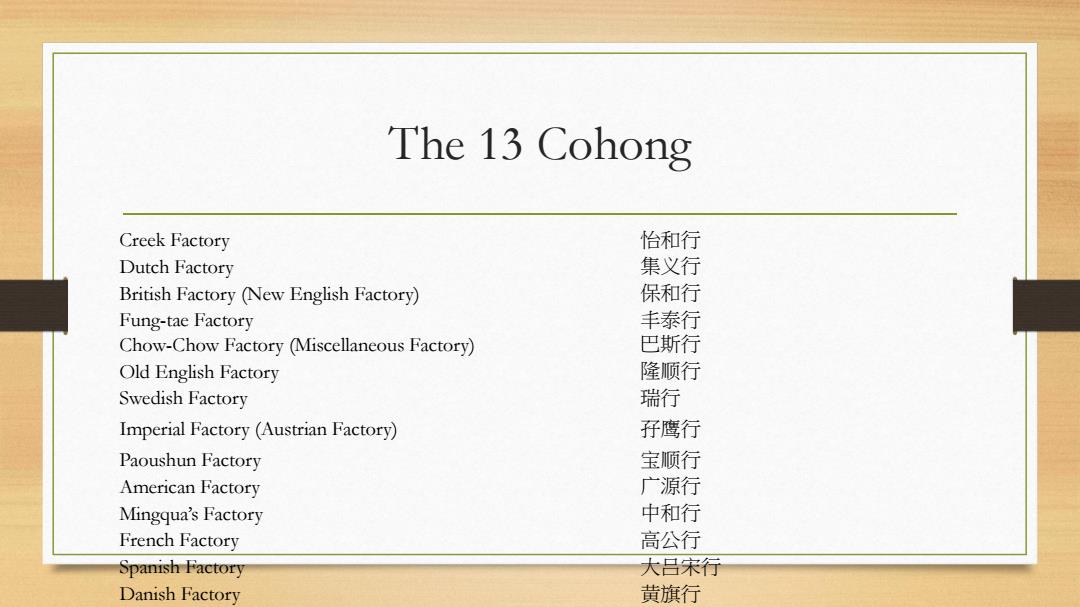
The 13 Cohong Creek Factory 怡和行 Dutch Factory 集义行 British Factory New English Factory) 保和行 Fung-tae Factory 丰泰行 Chow-Chow Factory (Miscellaneous Factory) 巴斯行 Old English Factory 隆顺行 Swedish Factory 瑞行 Imperial Factory (Austrian Factory) 孖鹰行 Paoushun Factory 宝顺行 American Factory 广源行 Mingqua's Factory 中和行 French Factory 高公行 Spanish Factory 大吕宋行 Danish Factory 黄旗行
The 13 Cohong Creek Factory 怡和行 Dutch Factory 集义行 British Factory (New English Factory) 保和行 Fung-tae Factory Chow-Chow Factory (Miscellaneous Factory) 丰泰行 巴斯行 Old English Factory 隆顺行 Swedish Factory 瑞行 Imperial Factory (Austrian Factory) 孖鹰行 Paoushun Factory 宝顺行 American Factory 广源行 Mingqua’s Factory 中和行 French Factory 高公行 Spanish Factory 大吕宋行 Danish Factory 黄旗行
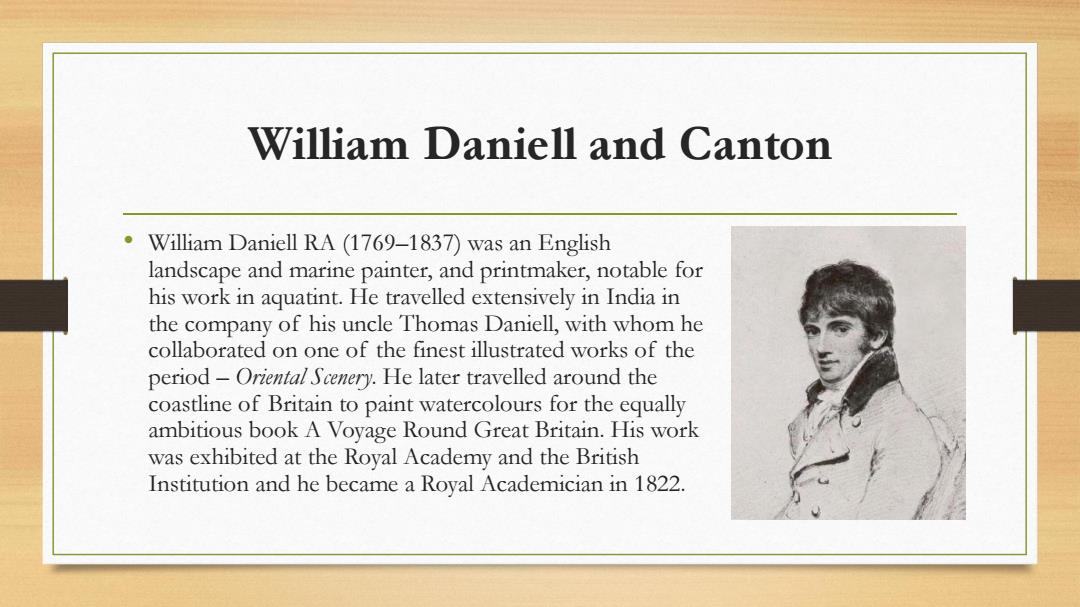
William Daniell and Canton William Daniell RA(1769-1837)was an English landscape and marine painter,and printmaker,notable for his work in aquatint.He travelled extensively in India in the company of his uncle Thomas Daniell,with whom he collaborated on one of the finest illustrated works of the period-Oriental Scenery.He later travelled around the coastline of Britain to paint watercolours for the equally ambitious book A Voyage Round Great Britain.His work was exhibited at the Royal Academy and the British Institution and he became a Royal Academician in 1822
William Daniell and Canton • William Daniell RA (1769–1837) was an English landscape and marine painter, and printmaker, notable for his work in aquatint. He travelled extensively in India in the company of his uncle Thomas Daniell, with whom he collaborated on one of the finest illustrated works of the period – Oriental Scenery. He later travelled around the coastline of Britain to paint watercolours for the equally ambitious book A Voyage Round Great Britain. His work was exhibited at the Royal Academy and the British Institution and he became a Royal Academician in 1822
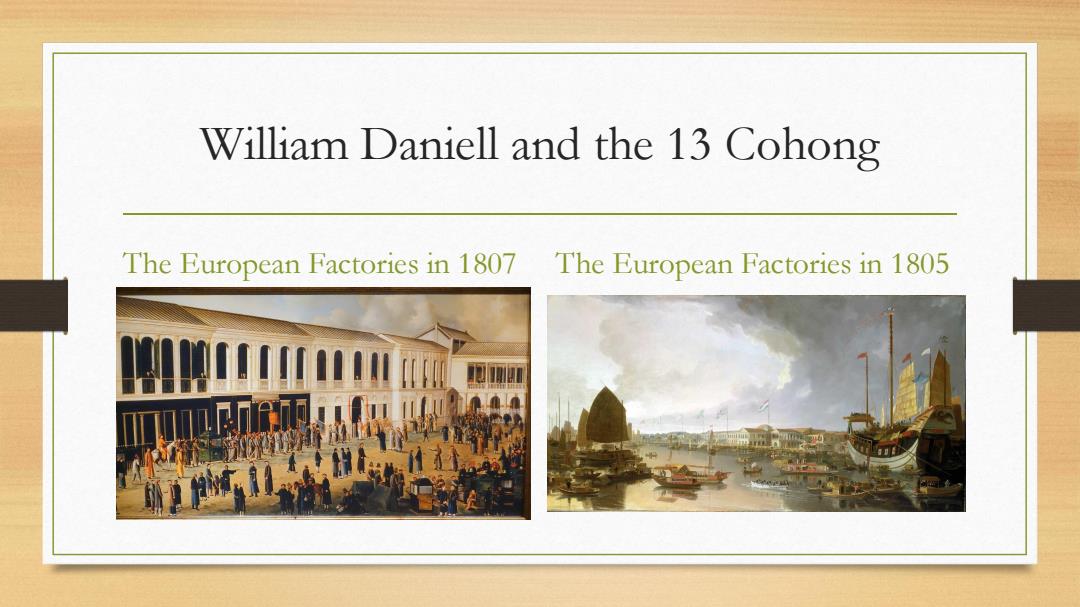
William Daniell and the 13 Cohong The European Factories in 1807 The European Factories in 1805
William Daniell and the 13 Cohong The European Factories in 1807 The European Factories in 1805

The Peak of the 13 Cohongs The Rebuilt in 1823 The fire in 1822
The Peak of the 13 Cohongs The Rebuilt in 1823 The fire in 1822

The Cohong before the Opium War
The Cohong before the Opium War

Hoppo and the Canton Custom House The Hoppo became central to China's trade relations with Europe after 1756,when the Canton system limited European trade to Canton and granted a monopoly in doing business with foreigners to a restricted group of Chinese merchants,who were organized into "Hongs,"or "trading houses."Controlling relations between these two monopoles made the Hoppo's position lucrative but not comfortable He had to pay off influential officials in order to be considered for appointment,pay them again once he was in office,and pay them once more at the end of his term if he expected to move on to another attractive position.He had only three years in office to recoup the money he had spent to gain it.The Hoppo sent an esimated million or so taels a year to Beijing,but his personal income might be tenor more times as much,perhaps 11 million taels.Moreover,18th century Canton trade revenues increased by as much as 300 per cent,most of it in the 1790s. The power and responsibility for all aspects of foreign trade were in the hands of the that is,a representative of the Hoppo,as go-between and interpreter.The Hoppo's officers measured the length and width of the ship to determine its cargo capacity, negotiated the pavments the ship would pay based on that capacity,and set a time for the ship's officers to meet with the Hoppo, often in his ceremonial hall.In the early years,the Hoppo would personally lead as many as forty or fifty junks and sampans to conduct the measuring ceremony,which was accompanied by fireworks,band music, and,until they were judged too dangerous n the 1780s,cannon salutes.In those years, the Hoppo bestowed impressive gifts on the newly arrived ships,such as two live bulls,but by the early nineteenth century these gifts had become an empty formaliry
Hoppo and the Canton Custom House • The Hoppo became central to China's trade relations with Europe after 1756, when the Canton system limited European trade to Canton and granted a monopoly in doing business with foreigners to a restricted group of Chinese merchants, who were organized into "Hongs," or "trading houses." Controlling relations between these two monopolies made the Hoppo's position lucrative but not comfortable. He had to pay off influential officials in order to be considered for appointment, pay them again once he was in office, and pay them once more at the end of his term if he expected to move on to another attractive position. He had only three years in office to recoup the money he had spent to gain it. The Hoppo sent an esimated million or so taels a year to Beijing, but his personal income might be ten or more times as much, perhaps 11 million taels. Moreover, 18th century Canton trade revenues increased by as much as 300 per cent, most of it in the 1790s. • The power and responsibility for all aspects of foreign trade were in the hands of the Hoppo. His officers met each ship as it arrived at Whampoa Roads, the landing spot down-river from Canton, where each ship was required to engage a "Chinese linguist," that is, a representative of the Hoppo, as go-between and interpreter. The Hoppo's officers measured the length and width of the ship to determine its cargo capacity, negotiated the payments the ship would pay based on that capacity, and set a time for the ship's officers to meet with the Hoppo, often in his ceremonial hall. In the early years, the Hoppo would personally lead as many as forty or fifty junks and sampans to conduct the measuring ceremony, which was accompanied by fireworks, band music, and, until they were judged too dangerous in the 1780s, cannon salutes. In those years, the Hoppo bestowed impressive gifts on the newly arrived ships, such as two live bulls, but by the early nineteenth century these gifts had become an empty formality
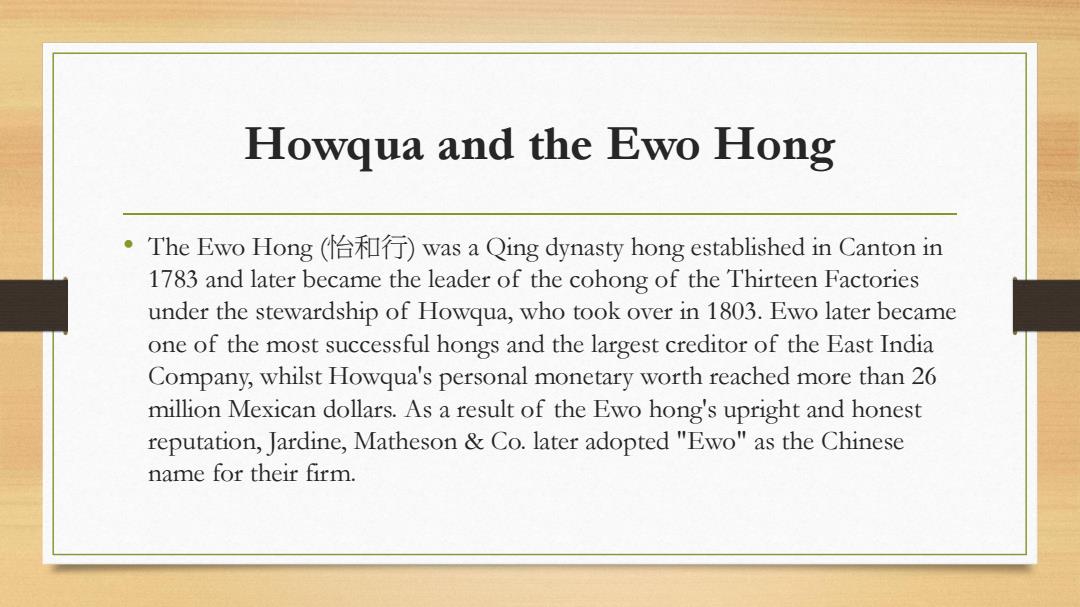
Howqua and the Ewo Hong The Ewo Hong(怡和行)was a Qing dynasty hong established in Canton in 1783 and later became the leader of the cohong of the Thirteen Factories under the stewardship of Howqua,who took over in 1803.Ewo later became one of the most successful hongs and the largest creditor of the East India Company,whilst Howqua's personal monetary worth reached more than 26 million Mexican dollars.As a result of the Ewo hong's upright and honest reputation,Jardine,Matheson Co.later adopted "Ewo"as the Chinese name for their firm
Howqua and the Ewo Hong • The Ewo Hong (怡和行) was a Qing dynasty hong established in Canton in 1783 and later became the leader of the cohong of the Thirteen Factories under the stewardship of Howqua, who took over in 1803. Ewo later became one of the most successful hongs and the largest creditor of the East India Company, whilst Howqua's personal monetary worth reached more than 26 million Mexican dollars. As a result of the Ewo hong's upright and honest reputation, Jardine, Matheson & Co. later adopted "Ewo" as the Chinese name for their firm
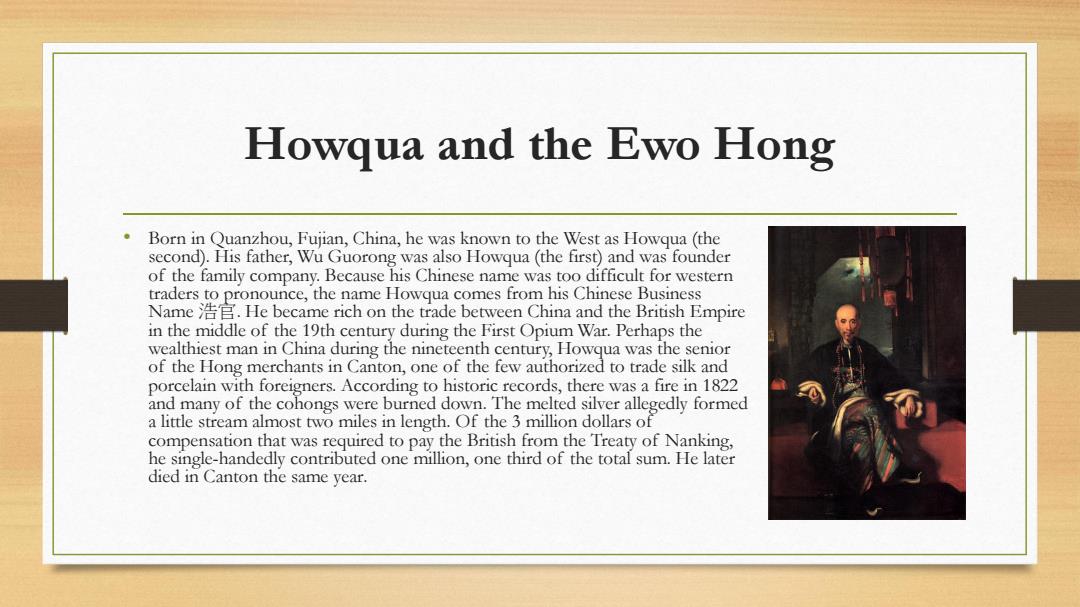
Howqua and the Ewo Hong Born in Quanzhou,Fujian,China,he was known to the West as Howqua(the second).His father,Wu Guorong was also Howqua(the first)and was founder of the family company.Because his Chinese name was too difficult for western traders to pronounce,the name Howqua comes from his Chinese Business Name.He became rich on the trade between China and the British Empire in the middle of the 19th century during the First Opium War.Perhaps the wealthiest man in China during the nineteenth century,Howqua was the senior of the Hong merchants in Canton,one of the few authorized to trade silk and porcelain with foreigners.According to historic records,there was a fire in 1822 and many of the cohongs were burned down.The melted silver allegedly formed a little stream almost two miles in length.Of the 3 million dollars of compensation that was required to pay the British from the Treaty of Nanking, he single-handedly contributed one million,one third of the total sum.He later died in Canton the same year
Howqua and the Ewo Hong • Born in Quanzhou, Fujian, China, he was known to the West as Howqua (the second). His father, Wu Guorong was also Howqua (the first) and was founder of the family company. Because his Chinese name was too difficult for western traders to pronounce, the name Howqua comes from his Chinese Business Name 浩官. He became rich on the trade between China and the British Empire in the middle of the 19th century during the First Opium War. Perhaps the wealthiest man in China during the nineteenth century, Howqua was the senior of the Hong merchants in Canton, one of the few authorized to trade silk and porcelain with foreigners. According to historic records, there was a fire in 1822 and many of the cohongs were burned down. The melted silver allegedly formed a little stream almost two miles in length. Of the 3 million dollars of compensation that was required to pay the British from the Treaty of Nanking, he single-handedly contributed one million, one third of the total sum. He later died in Canton the same year